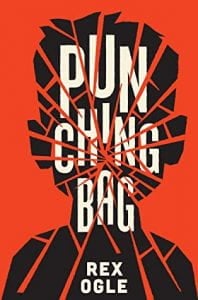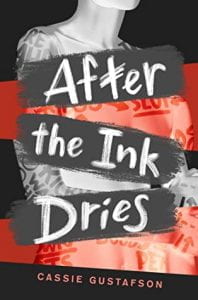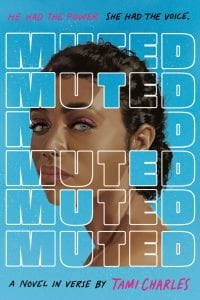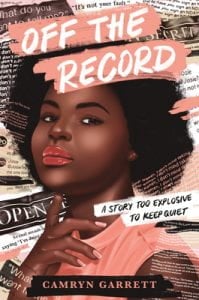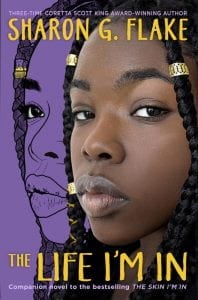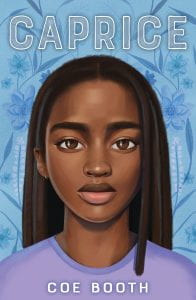 Booth, Coe. Caprice. Scholastic, 2022. 978-0-545-93334-6. $17.99. 243 p. Grades 6-8.
Booth, Coe. Caprice. Scholastic, 2022. 978-0-545-93334-6. $17.99. 243 p. Grades 6-8.
Sensitive, poetical Caprice is a rising eighth grader with a big decision: should she grab the opportunity of attending a prestigious boarding school or stick with her friends in Newark, New Jersey? Though she loved her seven-week stint at summer camp at Ainsley School for Girls, she is torn because of her closeness to her best friend, Nicole, a budding romance with Jarrett, and her commitment to the Center, the community place that fosters fun and leadership in her neighborhood. Through her poems and flashbacks, the reader learns of sexual abuse that Caprice keeps buried and secreted from her family. She is considerate of her parents’ precarious financial situation because of their faltering business and is scared that her need to be in Newark keeps her mother and father apart. Her return home a week before school starts corresponds with a call from Baltimore informing the family of her maternal grandmother’s serious illness. Caprice’s mother and grandmother have been estranged since Caprice was four-years-old when her grandmother sent Caprice and her mother away from the family home after a dangerous incident. Only Caprice and her grandmother know the real reason for their banishment, but her mother has lived all these years with hurt and resentment, alienated from her mother and brother, Raymond. The reader meets Caprice over an important week when school, friendships, and soul-searching come to a head. Her sporadic panic attacks increase, and she waffles between closing herself off and speaking up for herself in new ways. In Caprice, Coe Booth tackles a difficult topic by mining the memories and feelings of Caprice as she faces her demons and challenges herself to esteem who she is. Caprice’s immediate family is loving and communicative. Her friendships with both adults and kids at the Center are genuine and nicely developed. Though the confrontation with her abuser at story’s end avoids any expected messiness and description, the emotions Caprice experiences throughout the novel will resonate with many readers dealing with changes in their lives. The students at Ainsley are international: New Zealand, Ghana, Toronto. Race is not mentioned directly in the book; however, Caprice gets her locs done and the book’s cover art displays an African American girl, so there are implications that the other characters are African American.
THOUGHTS: Coe Booth lets Caprice’s voice come through in the narration and the typical middle school dialogue with which readers will relate. The thriving Center Caprice attends is core to the community and helps to shape the kids who participate in the different activities it affords, from a Women’s Club, to film making, to dance. Caprice takes part in some neat poetry activities that readers can replicate. Her leadership qualities come out in her refusal to be treated less than boys and to tolerate snide remarks about her body. The adults surrounding Caprice–even though they know nothing about her abuse at the time–are nurturing and say the right things. Caprice’s pride in her neighborhood and loyalty to her friends are good discussion points.
Realistic Fiction Bernadette Cooke School District of Philadelphia
Twelve-year-old Caprice should be having the time of her life. She just finished a seven week summer program at a prestigious school in upstate New York, and she has now been offered a full scholarship through high school. She has a week to make the decision to accept the scholarship. She returns to her home in Newark, NJ and learns that her grandmother is seriously ill. This brings back the memories of the abuse that she endured while living there with her grandmother and uncle. She has remained quiet about this abuse and has told no one. The deadline to commit to Ainsley is coming closer and closer, and Caprice is struggling with her past while trying to make a decision about her future.
THOUGHTS: This book is a powerful read for a middle schooler. It addresses the issue of child abuse – sexual and emotional. It could have some triggers for some readers.
Realistic Fiction Victoria Dziewulski, Plum Borough SD
Sometimes it’s hard for kids to decide what they want from life, and what they are willing to let go of, until they are faced with some life-changing events. This is certainly true for Caprice, a smart, motivated, and mature 7th grade girl who has just finished an exclusive summer leadership experience at a private school in an affluent part of Washington, D.C. She loved that school, but she also loves her home and friends in urban New Jersey. After she is offered a full scholarship to return to the private school for her 8th grade year, she quickly must decide whether she is willing to give up her familiar home and her best friend in favor of the school opportunity of her dreams. In addition to the stress of her impending education decisions, past childhood trauma and the declining health of a grandmother she hasn’t seen in years add to her troubles. Will Caprice be able to navigate her painful past, her complicated family, and her new and old friendships to see her way to a brighter future?
THOUGHTS: Caprice and her family are warmly drawn, and her friendships feel so real! This book deals with difficult topics including childhood abuse, family secrets, divorce, adolescent feelings, and confusion about the direction and meaning of one’s life, but everything is dealt with a sensitive and graceful hand that still makes the book a pleasure to read and recommend to students.
Realistic Fiction Erin Faulkner, Cumberland Valley SD
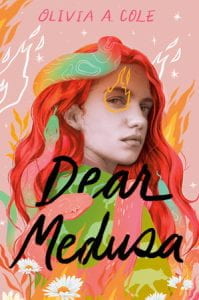 Cole, Olivia A. Dear Medusa. Labyrinth Books, 2023. 978-0-593-48573-6. 377 p. $18.99. Grades 9-12.
Cole, Olivia A. Dear Medusa. Labyrinth Books, 2023. 978-0-593-48573-6. 377 p. $18.99. Grades 9-12.




